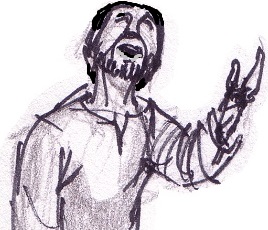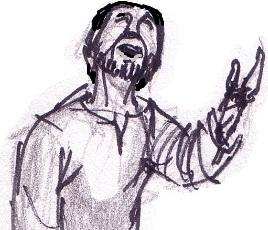

“Jesus began to show his disciples that he must go to Jerusalem and suffer” (Matthew 16:23).
Twenty-Second Sunday of the Year
Jer 20:7-9; Ps 63; Rom 12:1-2; Matt 16:21-27
How did Jesus come to believe that he had to go to Jerusalem to suffer and die? We can thank the local synagogue school for teaching Jesus to read the Scriptures and the local rabbi for inviting him from his bar mitzvah on to stand up during Sabbath services to read from the scrolls of the prophets. It was during his formative years that the image of God’s “Suffering Servant” took hold in Jesus’ consciousness under the guidance of the Holy Spirit.
Jesus knew the messianic hope of Israel that a leader like David would free the people from oppression. He also knew from Isaiah and Jeremiah that the way this redemption would occur was not by military force but through the power of love. This alternate message was like a mysterious thread gradually woven into the fabric of the history of the promise. It was like the tiny whisper Elijah heard on the mountain, God’s secret plan to defeat evil with powerless self-sacrificing love.
Jesus knew that every prophet suffered and that many had died for fearlessly proclaiming God’s word. He surely knew Jeremiah’s lament in today’s reading that the call to preach was an overwhelming intimacy he could not escape, like fire in his bones. Filled with a growing sense that he was on the same path of suffering, Jesus heard his own prophetic call when the voice from the cloud at his baptism said, “This is my beloved Son, in whom I am well pleased” (Matt 3:17). From that moment on, Jesus knew that he was to fulfill the Law and the Prophets in Jerusalem, “where all the prophets go to die” (Luke 13:33).
No one can claim this vocation for himself or herself. It is unsustainable without God’s grace. We often do not know who the prophets are until they are gone, only that their lives were filled with controversy and rejection. They do not tell the future but indict the present for resisting and distorting God’s will for creation and human community. False prophets who invoke God’s approval of a corrupt status quo are the greatest charlatans. Real prophets sound the warning when human conceit claims divine sovereignty over human dignity and destiny.
Jesus perfected and fulfilled the prophetic role that others now play in our own time. He also vindicated the paradox of suffering love as how history advances toward truth and justice despite even violent opposition. We commemorate this truth on the 57th anniversary of the historic march on Washington in 1963. Jesus’ nonviolent path was echoed by Martin Luther King Jr and John Lewis, who had heard it in Gandhi’s confidence even when change seemed impossible: “When I despair, I remember that all through history the way of truth and love have always won. There have been tyrants and murderers, and for a time, they can seem invincible, but in the end, they always fall. Think of it--always.”
Jesus invites his disciples to take the prophetic path and to accept the pattern of apparent loss for promised gain that he embraced on the cross. “Whoever wishes to save his life will lose it, but whoever loses his life for my sake will find it.”
Advertisement








